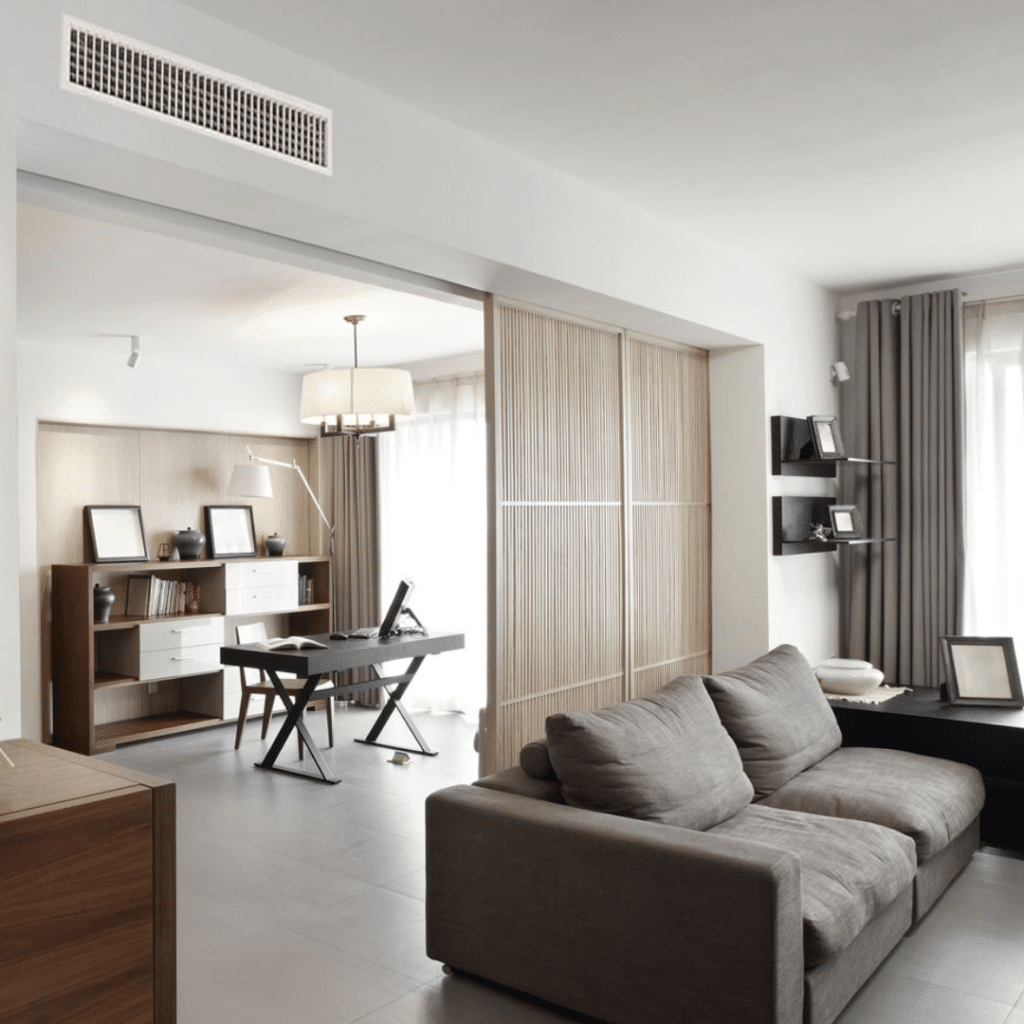In the colder months, it is important to find effective solutions that keep indoor spaces comfortably warm without compromising on air quality. Ducted air conditioning systems are a versatile choice for heating during the colder months. Using diffusers positioned in the floor, ceiling or a bulkhead, these air conditioners distribute warm air, providing consistent comfort during those cold days and nights.
Benefits of Ducted Air Conditioning for Winter
If you have multiple rooms or large open spaces to keep warm this winter, installing a ducted air conditioning system can have many benefits.
Efficient Heat Distribution
Ducted systems are designed to offer installation flexibility, allowing for customised airflow management. Rather than just heating a single room with a wall mounted split system or portable heater, a ducted system has the benefit of being hidden in the roof space with ductwork going to each room, which allows you to heat multiple areas in your home at once. This means that whether it is distributing warm air in the winter or cold air in the summer, ducted air conditioners can efficiently manage the climate across multiple rooms. In winter, this ability to circulate warm air where it is needed helps maintain a comfortable temperature throughout the entire building.
Enhanced Zone Control
Mitsubishi Electric ducted air conditioning systems offer a smart way to heat your home more efficiently. By upgrading with optional zone controllers, you can create customised zones that warm only the areas you need. For example, you might create separate zones for:
- Living areas (lounge room, dining room, kitchen) for cosy nights in
- Bedrooms for a warm wake-up on chilly mornings
- Home offices or study areas for focused work sessions
This feature is especially useful in winter, ensuring you’re not wasting energy on empty rooms. Plus, it helps you manage your energy consumption and stay cosy where it counts. Imagine being able to warm up your bedroom zone on a cold winter morning, then switching to the living area zone in the evening when you’re relaxing with your family.
Concealed and Quiet Operation
One of the best things about ducted air conditioning systems is how discreetly they operate. They’re out of sight, tucked away in your ceiling cavity or bulkhead space, and they run so quietly you’ll hardly notice they’re there. This is especially great during winter when you need consistent warmth without the distraction of a noisy system. Plus, the concealed ductwork ensures a seamless blend with your home’s interior design.
Setting the Ideal Winter Temperature
The ideal temperature for your home in winter should balance comfort with energy efficiency. Generally, setting your ducted air conditioner between 18°C to 23°C during the day is effective for keeping you warm without overworking your air conditioning system. At night, temperatures can be lower, around 17°C to 20°C, to promote better sleep without sacrificing comfort.
If you are working from home, the optimum comfort for sedentary work is usually between 20°C – 26°C. If you are doing more physical work, you might prefer a lower temperature range.
Energy Efficiency and Cost Considerations
One hesitation about installing a ducted system can be the perceived running costs to heat the entire home. But compared to conventional gas or portable electric heaters, a reverse-cycle air conditioner system is a more energy-efficient choice.
Understanding Energy Consumption
Energy usage in heating can vary significantly from one home to another, influenced by factors like insulation quality, house size, and local climate conditions. To effectively manage and anticipate your heating costs this winter, it is important to understand your energy consumption. The Australian Government’s Energy Rating website is a valuable resource where you can calculate the energy consumption and running costs of your heating systems.
Practical Tips to Enhance Energy Efficiency
To reduce the energy consumption of your heating, consider these tips:
- Choose More Energy Efficient Air Conditioners: Select an air conditioner with a lower power input value (look for Total Input (Rated) in kW in the brochure specifications). Refer to the Energy Rating label for specifics.
- Insulate and Seal: Install quality insulation and use draught-proofing measures like closing windows and curtains to keep warm air inside. Consider adding external shutters or blinds for extra insulation. If you have bushfire or security shutters consider closing them overnight when it’s really cold.
- Use Zone Control: Zone control for ducted systems allows you to only heat the rooms you need to.
- Use Wi-Fi Control Options: By connecting your air conditioner to your smartphone or tablet, you will have ‘on the go’ control to ensure you never leave your system running unnecessarily.
- Consult a Specialist: If purchasing a new air conditioner, consult a specialist for a heat load calculation to determine the optimal kW capacity for your heating and cooling needs. For example, air conditioners with insufficient kW capacity will operate continuously, leading to excessive energy consumption. And if your air conditioner is too big, it will frequently turn off and on, failing to run at optimal efficiency and resulting in unnecessary expenses.
Air Quality and Energy Savings for Ducted Systems
Mitsubishi Electric ducted air conditioning systems, when integrated with optional Lossnay heat recovery ventilation, offer a comprehensive solution for improved indoor air quality and energy efficiency. The Lossnay system exchanges stale indoor air with fresh, filtered outdoor air while recovering heat energy and maintaining optimal temperature and humidity levels.
The heart of the Lossnay system is the specialised heat exchanger that prevents air mixing while allowing temperature and/or humidity transfer.
The Lossnay system is particularly beneficial in situations where opening windows would compromise indoor comfort, such as on cold winter nights. By bringing in fresh air without significantly altering the room’s temperature, it reduces the need for increased air conditioning, leading to energy savings.
Mitsubishi Electric offers flexible options for both standalone Lossnay systems and integration with existing ducted air conditioning installations. This versatility allows for tailored ventilation solutions to meet diverse needs. Additionally, optional high-grade filters are available for enhanced air purification, making the system ideal for homes in high-density or pollution-prone areas.
Smart Features and User Control for Winter Comfort
Choosing an air conditioning unit that comes equipped with modern features, such as Wi-Fi control and zone control, is beneficial for several reasons. These advanced capabilities allow for precise temperature adjustments, which is especially important during winter.
- Zoning Capabilities: Zoning is particularly beneficial in winter, allowing you to heat only the areas that are in use. A zone controller can create up to 4 or 8 separate zones, which ensures that unoccupied areas do not waste heat.
- Wi-Fi Control: With optional Wi-Fi control, you can use a smartphone or tablet to manage your heating settings from anywhere. This ensures your home is warm when you need it and conserves energy when you do not.
- Sensors and Timers: Zone controllers often offer features like occupancy and brightness sensors. These sensors can automatically reduce heating in unoccupied spaces or adjust based on natural light availability, helping maintain a comfortable environment. Timers can be set to heat your home right before you arrive or decrease the temperature when you leave, ensuring efficient use of your ducted air conditioner throughout the winter months. Take advantage of additional features such as Night set back function, Energy saving function (optional zone controller) and temperature range restriction. Ask your air conditioning specialist for more information.
Choosing the Right System
To select the right air conditioner, consider several factors, such as the size of the space, the specific climate conditions of your area, and the energy efficiency of the unit. Look for features like Wi-Fi control and zoning capabilities, which provide flexibility and energy savings. For detailed guidance and to explore a range of options that meet these criteria, explore Mitsubishi Electric ducted air conditioners. For personalised advice, contact your local air conditioning dealer.
FAQs
Which mode is best for AC in winter?
The best mode for your air conditioner during cold weather is the “Heat” mode, which efficiently warms your living area. To optimise energy use and maintain a comfortable indoor temperature, complement this mode with energy-saving strategies such as using zoning capabilities to warm only occupied areas and ensuring your home is well insulated to retain heat.
Can you run a ducted air conditioner 24/7?
While running ducted air conditioning around the clock is technically possible, it is not recommended for energy efficiency and cost purposes. Instead, utilise zoning and smart controls to operate the system only when necessary and maintain fresh air and comfort without excessive energy consumption.
Consider using a timer to automatically turn the unit off so you don’t have to worry about leaving it on all night if you don’t need to.
Do I have to service my air conditioner before winter?
Servicing your air conditioner before winter is recommended to ensure optimal performance during the colder months. Regular maintenance checks can help identify and fix potential issues, such as leaks or inefficiencies before they lead to more significant problems.



